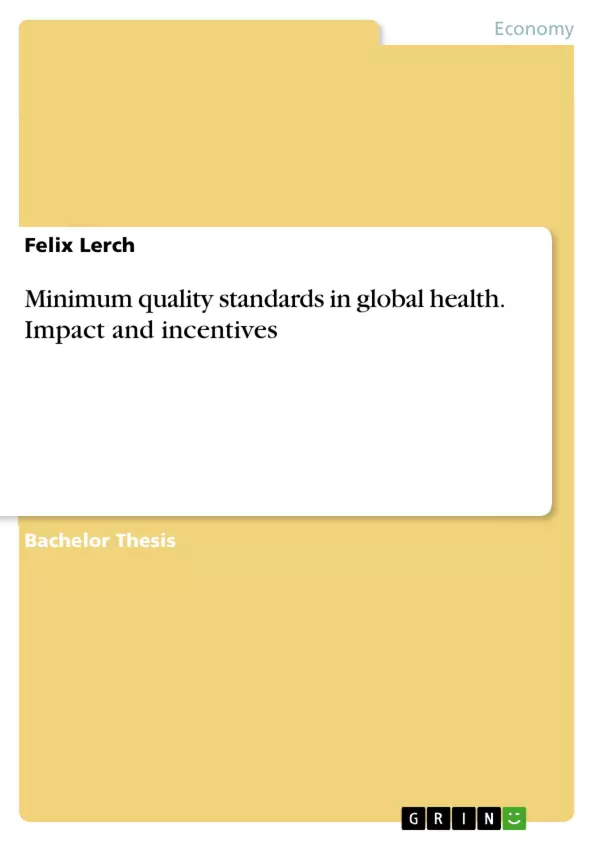In developing countries people do not have adequate access to essential medicines. These countries’ health care systems lack the financial resources for providing appropriate and comprehensive medical support. Moreover, there is a demand for medical innovations which allow fighting neglected diseases. Global health organizations provide assistance during the procurement process of medicines for countries which are subjected to these challenges. In order to ensure that only the right products for the intended purpose at appropriate quality levels reach those in need, these organizations require specific quality standards from their suppliers. With the demand for the implementation of quality assurance measures for pharmaceutical manufactures, the question about the impact of quality standards arises. This thesis provides answers to the question whether and how market participants are affected by these factors.
For this purpose, this work makes use of several papers dealing with the effects of introducing a minimum quality standard (MQS). Since organizations aim at ensuring security of supply at affordable prices, further questions evolve regarding new product development and competition between firms: How can organizations incentivize innovation and market entry of pharmaceutical manufacturers? Which tools do they use and can these tools address possible drawbacks of the introduction of a MQS? An answer to the latter question is given by connecting the results of game-theoretical models with the approaches of existing incentive mechanisms in global health.
The remaining part of this thesis is structured in the following way: Section 2 presents three organizations and their approaches to ensure the product’s compliance with quality standards. In section 3, several game-theoretical models on MQS are analyzed and compared. The analysis highlights the models’ findings, as well as differences between them and the models’ construction. Section 4 considers several incentive mechanisms for suppliers.
Inhaltsverzeichnis (Table of Contents)
- Introduction
- Global Health Organizations and Quality Standards
- UNICEF
- The Global Fund
- World Health Organization
- Theoretical Models on Minimum Quality Standards
- Competition in a Duopoly
- Competition with more than two Firms
- Market Entry and Innovation
- Limitations of the Models and Implications for Global Health
- Incentives: Push and Pull Mechanisms
- Advance Market Commitment
- Priority Review Voucher
- Health Impact Fund
- R&D Tax Credits and Research Grants
- Discussion
- Conclusion
Zielsetzung und Themenschwerpunkte (Objectives and Key Themes)
This thesis examines the impact of minimum quality standards (MQS) on pharmaceutical manufacturers and explores how global health organizations incentivize innovation and market entry in the context of limited resources and the need for affordable medicines in developing countries.
- The impact of MQS on market participants and their behaviour
- Incentivizing innovation and market entry of pharmaceutical manufacturers
- Tools and strategies used by global health organizations to address drawbacks of MQS
- Analysis of gametheoretical models and their application in the context of global health
- Comparative evaluation of various incentive mechanisms for suppliers
Zusammenfassung der Kapitel (Chapter Summaries)
The thesis begins by introducing the challenges of access to essential medicines in developing countries and the role of global health organizations in ensuring quality standards. Chapter 2 provides an overview of three prominent organizations: UNICEF, the Global Fund, and the World Health Organization, highlighting their approaches to quality assurance and procurement processes. Chapter 3 delves into theoretical models concerning MQS, examining competition dynamics, market entry, and innovation. The analysis compares and contrasts different models, emphasizing their findings and limitations. Chapter 4 explores various incentive mechanisms designed to encourage innovation and market entry for suppliers, including Advance Market Commitments, Priority Review Vouchers, Health Impact Funds, and R&D tax credits. The chapter concludes with a discussion of the effectiveness and potential drawbacks of these mechanisms.
Schlüsselwörter (Keywords)
The thesis focuses on minimum quality standards, global health organizations, pharmaceutical manufacturers, market competition, innovation, incentive mechanisms, gametheoretical models, and access to essential medicines in developing countries.
What are Minimum Quality Standards (MQS) in global health?
MQS are specific quality requirements set by organizations like WHO or UNICEF to ensure that only safe and effective medicines reach developing countries.
How do MQS affect pharmaceutical market competition?
MQS can act as a barrier to entry for smaller firms but also incentivize high-quality manufacturers to innovate and differentiate themselves.
What is an Advance Market Commitment (AMC)?
An AMC is a financial commitment to subsidize the purchase of a vaccine or medicine if it is developed and meets pre-defined quality standards.
What is the role of the World Health Organization (WHO) in procurement?
The WHO provides prequalification services, verifying that pharmaceutical products meet international standards for safety and quality.
How can organizations incentivize R&D for neglected diseases?
Through pull mechanisms like the Health Impact Fund or push mechanisms like research grants and tax credits.



